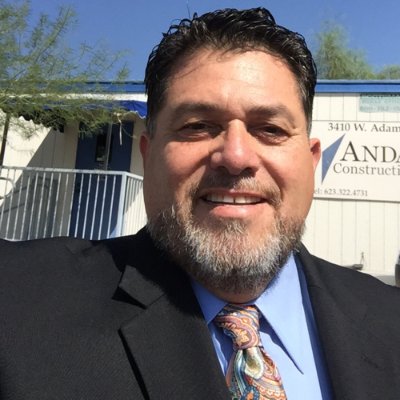Contractor Sees Firsthand How Draconian Immigrant Laws Hurt Arizona’s Economy
Date: April 12, 2016

In 2012, Luis de la Cruz was at a banquet in Washington, D.C., being held to recognize minority-owned businesses. But when guests learned that he was from Arizona, they walked away in disgust. The state’s recently enacted anti-immigration bill had poisoned his reputation. “The only thing that happens” when anti-immigration laws get passed, de la Cruz says, “is that our state gets hurt.”
Today, De la Cruz runs a $5 million construction company, but he came from humble beginnings. One of five children of a single mother, he was raised in public housing in East Los Angeles. “I never even graduated high school,” de la Cruz says. He joined the Marines at 17, worked in construction for years, and eventually started his own business, Andale Construction, in 2006. “Everybody was telling me I was crazy because I had no formal training,” he says. “Afterwards, everybody said, ‘I underestimated you.’ ”
Andale Construction started taking on federal contracts in 2009, and now employs 30 people in Arizona and California. de la Cruz is working closely with the co-founder of Grid Logistics on an $18 billion port modernization project in Los Angeles that will change the face of the city and create thousands of jobs. It will be instrumental in the city’s Olympic bid, and will improve air quality and public health.
Immigrants coming into the United States from Mexico and Central America would prefer to move to Nevada or California rather than Arizona, which is perceived as being unfriendly to immigrants.
Yet de la Cruz has a hard time finding qualified workers in his home state of Arizona. “It’s hard to hire the right people,” he says. Immigrants coming into the United States from Mexico and Central America would prefer to move to Nevada or California rather than Arizona, which is perceived as being unfriendly to immigrants. In short, anti-immigration laws are chasing badly-needed workers away, he says.
De la Cruz believes the federal government should create a path to citizenship for undocumented immigrants. “It’s vitally important,” he says. “Time is money. We need to move in the direction where we can build a better tomorrow. How can you grow and expand into the 21st century when you have a shortage of talent? Not taking action on immigration is doing nothing but hurting America.”
